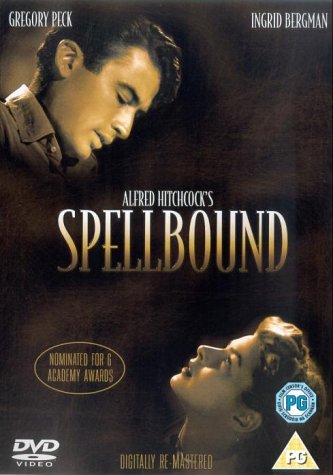
SPELLBOUND
US, 1945, 111 minutes, Black and white.
Ingrid Bergman, Gregory Peck, Rhonda Fleming, Leo G. Carroll.
Directed by Alfred Hitchcock.
Spellbound made an impact at the time of its release. It probably does not rank so highly now amongst Hitchcock's films. It may be the portentous nature of the screenplay by the versatile Ben Hecht, or the greater sophistication today concerning psychoanalysis, and the way it is presented in this film. Nevertheless it is good Hitchcock with much to commend it.
Gregory Peck was at the beginning of his career. (After this he made The Paradine Case for Hitchcock). Ingrid Bergman was at the height of her career. She also went on to make Notorious and Under Capricorn for Hitchcock. The mysterious aspects of the film are handled intriguingly, especially the scene with Ingrid Bergman which reveals the murderer. In fact, it is in such details as this that Hitchcock excels and there are many of these, especially the sequence at the railway station. Spellbound could be linked to such films as Vertigo, with the problems of madness and identity. An interesting feature of the film (which some critics say is not well integrated) is the dream sequence done in his surrealistic style by Salvador Dali.
1. Was this a good Hitchcock thriller, or too contrived? Was it interesting and exciting?
2. The significance of the quotation from Shakespeare - that it was not in man's stars, but in himself.......?
3. The importance of psychoanalysis in the film. Was the treatment convincing or too glamourised? Did the psychoanalytical background make sense to the audience?
4. Does the film now seem dated? Why? Does it detract from its impact?
5. Does the audience readily identify with the characters? Ingrid Bergman as a glacial heroine, as a doctor? Gregory Peck as a rugged, suffering hero?
6. Did themes of love, dedication, support in times of suffering make impact in the film? Which scenes did you think most important?
7. How important was the reliving, re-enactment of feared situations? Does the confrontation of such situations bring back memory and destroy fear?
8. The significance of dreams - what impact did the film-style and interpretation of these dreams have on the audience?
9. Comment on the skiing incident, memory of childhood accident, recovery from amnesia and recognition of the truth. Did you think the film ended here?
10. How important dramatically was the irony of the discovery that Dr. Edwards had been shot? Why? Did you suspect Dr. Murchison? Why?
11. Comment on the themes of truth and the way truth is discovered.
12. Give your views of the special techniques, flashbacks, dreams, super-imposed faces.
13. Did the music contribute to the film or was it over-dramatic?
14. Should this just be considered as a Hitchcock thriller, or was there more depth in the film regarding insight into human behaviour?